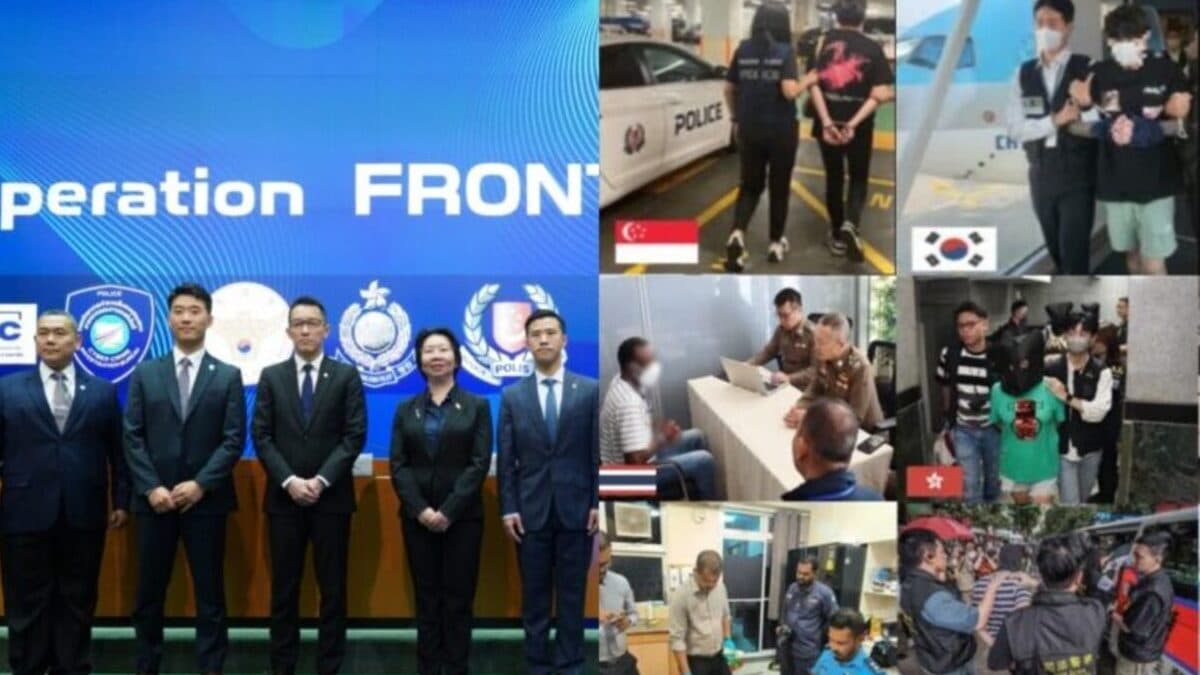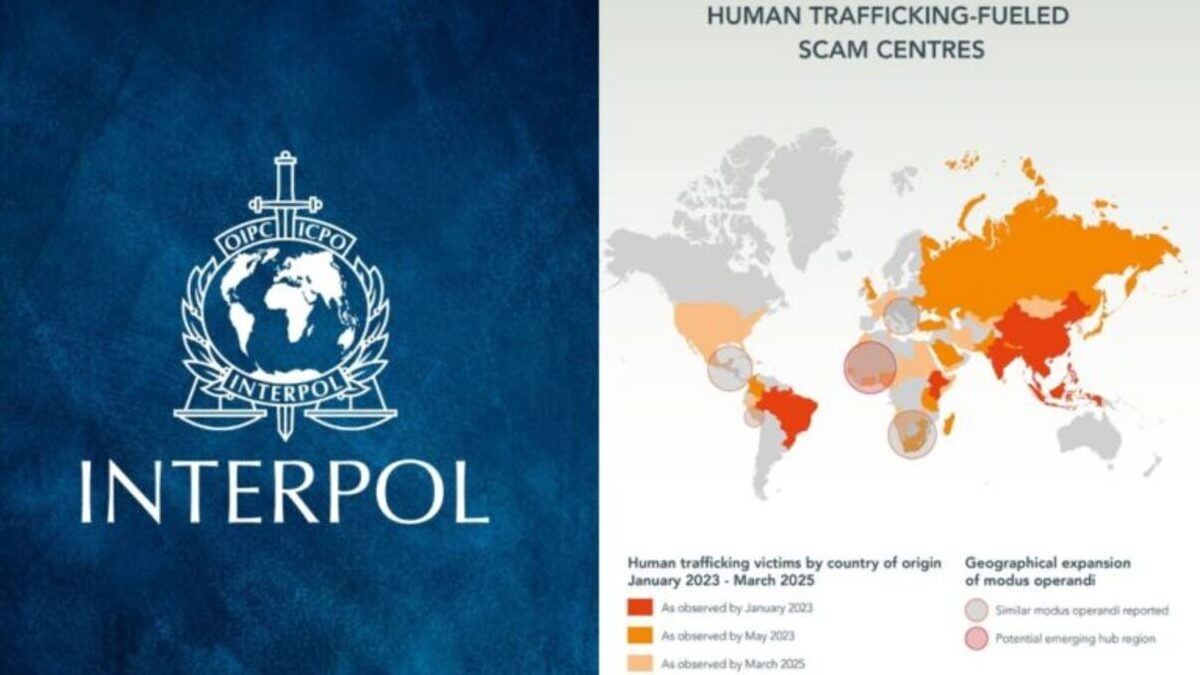1,858 Arrested in Asia-Wide Anti-Scam Operation; Over S$289m Lost by Victims
A month-long transnational anti-scam operation across seven Asian jurisdictions has led to nearly 1,900 arrests, with victims collectively losing more than S$289 million. Singapore alone accounted for 106 arrests and over 1,300 scam cases.

- Transnational anti-scam operation (28 Apr–28 May 2025) led to 1,858 arrests across seven Asian jurisdictions.
- 33,900 others remain under investigation; victims lost S$289m in 9,200 scam cases.
- Singapore: 106 arrests, 545 under probe, S$39.3m in losses, S$7.69m seized.
- Hong Kong: 337 arrests, HK$475m lost, HK$49.5m intercepted.
- South Korea: 116 arrests, surge in impersonation and “no-show” scams.
- Thailand: 582 arrests, US$3.17m recovered, crackdown on online scam infrastructure.
- Authorities highlight need for international cooperation via platforms like Frontier+.
A sweeping transnational anti-scam operation has resulted in the arrest of 1,858 individuals across seven Asian jurisdictions, according to the Singapore Police Force (SPF). Conducted between 28 April and 28 May 2025, the coordinated effort highlighted both the global reach of scam syndicates and the growing importance of cross-border collaboration in tackling cyber-enabled crime.
The month-long operation involved law enforcement agencies from Singapore, Hong Kong, South Korea, Malaysia, Maldives, Thailand, and Macau. Another 33,900 people are under investigation for suspected involvement in scam activities.
Authorities revealed that victims lost more than S$289 million (US$225 million) in over 9,200 reported cases during the operation period.
Singapore cases: 106 arrests and millions seized
In Singapore, 106 suspects were arrested and another 545 placed under investigation. These individuals are linked to over 1,300 scam cases that resulted in estimated losses of S$39.3 million.
SPF froze 714 bank accounts connected to the scams, seizing more than S$7.69 million.
The police noted that ongoing probes include offences such as abetment to cheating and the unlawful disclosure of Singpass credentials and banking access codes.
Wide range of scams targeted
Authorities said scams investigated under the operation ranged from impersonations of government officials to investment fraud, rental scams, and online romance cons.
Across the jurisdictions, more than 32,600 suspicious bank accounts were identified and frozen, with S$26.2 million seized.
In one case flagged by SPF, victims were duped into transferring S$25,000 and S$45,000 to local accounts in two separate scams impersonating Chinese customer service officers. Part of the stolen funds was quickly moved to Malaysia, but with assistance from Malaysia’s National Scam Response Centre, more than S$19,000 was recovered.
“Stronger together” in digital age
David Chew, Director of SPF’s Commercial Affairs Department, stressed that scam syndicates exploit borderless digital systems and sophisticated laundering techniques.
“In today’s digital age, scam syndicates operate without geographical constraints, employing increasingly sophisticated methods across multiple jurisdictions to defraud victims and launder their illicit proceeds,” he said.
“No single jurisdiction has an adequate answer to this scourge, but we are collectively stronger together.”
Chew noted that the operation was part of Frontier+, a regional anti-scam platform fostering intelligence-sharing among 10 jurisdictions, including Australia, Canada, and Indonesia.
Hong Kong: 337 arrests, HK$475m lost
At a press conference in Hong Kong on 3 June, Chief Superintendent Wong Chun-yue of the Commercial Crime Bureau said police had arrested 337 people linked to 301 cases, spanning online shopping scams, phone fraud, investment schemes, and employment cons.
Victims in Hong Kong lost about HK$475 million (US$60.6 million). Authorities also froze 68 bank accounts, intercepting HK$49.5 million.
Wong warned that scam tactics are increasingly being replicated across borders. For instance, customer service scams that surged in Hong Kong in 2024 have since appeared in Singapore and Macau.
Between January and March 2025, Singapore recorded more than 600 such scams, in which fraudsters impersonated representatives from WeChat, Alipay, or UnionPay to pressure victims into revealing sensitive financial information.
South Korea: rise in impersonation and corporate scams
South Korean authorities arrested 116 people during the operation and recovered about US$657,000 in losses.
Police reported sharp increases in impersonation scams, particularly fraudsters posing as soldiers, prison officers, or celebrities. Cases of this type have risen nearly five-fold in five years.
Businesses have also been targeted by “no-show scams,” where fraudsters order goods and demand deposits under false pretences before disappearing.
In 2024, more than 1,700 fake credit card call scams were recorded nationwide, with total losses reaching US$178 million.
Thailand: dismantling online scam infrastructure
Thai authorities reported that scams in the country are overwhelmingly online-based. Police intensified efforts to dismantle fake websites, mule accounts, and fraudulent SIM cards that underpin the operations.
As part of Frontier+, Thailand arrested 582 suspects and recovered US$3.17 million in illicit funds. The country has also worked with international partners to track cross-border networks.
Continuing fight against scams
Law enforcement officials across the seven jurisdictions emphasised that regional cooperation will remain essential. Wong of Hong Kong noted that further collaboration is planned with Thailand and Myanmar to pursue the ringleaders of Southeast Asia’s large-scale scam syndicates, often linked to compounds such as “KK Parks.”
“The scale of this operation demonstrates our collective resolve to disrupt scam syndicates,” Wong said, “but the fight is far from over.”








0 Comments